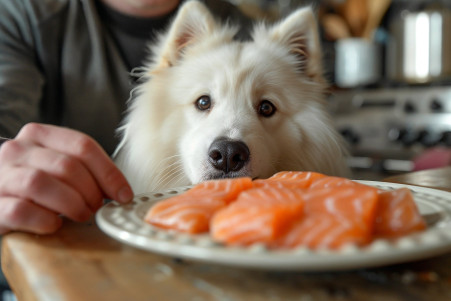Can Dogs Eat Canned Salmon? Benefits and Risks Explored
10 April 2024 • Updated 9 April 2024

If you’ve ever found yourself asking if canned salmon is good for dogs, you’re not alone. Pet parents everywhere are wondering if they can share this pantry staple with their pups, and there are definitely some potential benefits and risks to consider. Canned salmon can be a good source of protein, omega-3 fatty acids, and other important nutrients that can help support your dog’s skin, coat, and overall health. That said, it’s important to remember that canned salmon should only be given to dogs in moderation, especially since it has higher fat and sodium levels than fresh salmon.
That said, while there are some definite benefits to feeding your dog canned salmon, there are also some important things to keep in mind about its ingredients, how much you should feed your dog, and even some potential dangers. To help you better understand the topic, we’ve taken a deep dive into the information provided by veterinary nutritionists, studies on dog nutrition, and advice from well-known pet organizations. By the end of this article, you’ll have a well-rounded view of whether canned salmon is a good choice for your dog and how to feed it to them safely.
Can dogs eat canned salmon?
Nutritional Benefits of Canned Salmon for Dogs
Canned salmon is a great source of high-quality protein, which is important for helping dogs build and maintain muscles, according to Pumpkin. It also contains omega-3 fatty acids, including EPA and DHA, which the American Kennel Club says can help with skin and coat health, cognitive health, and inflammation.
In addition to protein and omega-3s, canned salmon is full of important vitamins and minerals like vitamin D, B12, potassium, and selenium that are important for dogs. The bones are also soft enough to eat and provide a natural source of calcium, which is important for bone and teeth health.
In terms of the best options, pink or keta salmon are often suggested because they are lower in fat than king salmon. In fact, keta salmon is so low in fat that it's known as the "dog salmon" to Alaskan natives who have been feeding it to sled dogs for generations. By choosing these lower-fat canned salmon options, you can ensure that your dog is getting the nutrients they need without too much fat.
Potential Dangers and Considerations of Canned Salmon
Although canned salmon can be a healthy part of a dog's diet, there are some potential dangers and considerations to keep in mind. PetMD notes that canned salmon is often high in sodium, which can cause dehydration and other health problems in dogs if consumed in large amounts. In addition, oil-packed versions can lead to obesity, pancreatitis, and other issues associated with a high-fat diet.
Hepper explains that some canned salmon products may contain heavy metal toxins like mercury, which can be harmful if consumed regularly. Meanwhile, Pure Pet Food points out that raw or undercooked salmon can contain parasites and bacteria that can make dogs sick, so it's important to make sure the salmon is cooked thoroughly.
It's important to use canned salmon in moderation and to control portion sizes. If dogs eat too much canned salmon, it can lead to an upset stomach or other issues. As with any new food, it's important to introduce canned salmon to your dog's diet slowly and watch for any negative side effects.
Appropriate Portion Sizes and Frequency for Canned Salmon
Portion size is important when it comes to giving dogs canned salmon. According to Purina, the general rule of thumb is 1-2 tablespoons per 10 pounds of body weight, 2-3 times per week. Larger amounts can cause digestive upset, pancreatitis, and in some cases, mercury poisoning.
Pure Pet Food says that dogs can have up to 10g of salmon per 450g of body weight, or 10g per 500g of body weight. However, it's important to start with small amounts and monitor your dog for allergic reactions and other signs of stomach upset.
Wellbeing for Dogs notes that canned salmon should be used as an occasional treat or supplement and not as the main protein in a dog's diet. They also recommend rotating protein sources to ensure a well-rounded diet.
How to Prepare and Serve Canned Salmon to Dogs
If you're feeding your dog canned salmon, it's important to remove the skin and bones first, as Azestfor warns that the bones can splinter and cause damage to your dog's digestive system. The Idaho Potato Commission also suggests choosing canned salmon that's packed in water instead of oil, which can lead to obesity and other health problems.
For those who want to make homemade dog food with canned salmon, Rocky Kanaka offers a variety of recipes that include the protein-packed fish along with vegetables, grains, and other healthy ingredients, such as "Basic Salmon & Broccoli Dog Food" and "Canned Salmon Loaf Recipe." Meanwhile, Pook's Pantry includes a recipe for homemade dog food with salmon, spinach, and pumpkin.
No matter how you plan to serve canned salmon to your dog, it's important to mix it with other foods to ensure that your dog gets a well-rounded diet. Azestfor also notes that it's important to store and handle homemade dog food properly to ensure that it stays fresh and safe, and recommends portioning and freezing it for up to a year.
Can Dogs Eat Canned Salmon Skin?
Canned salmon skin is safe for dogs to eat in moderation, but there are a few caveats. According to the Alaskan Salmon Co., salmon skin is a good source of omega-3 fatty acids and healthy fats, which can help improve a dog's skin and coat. However, the skin also contains a higher fat content, which can cause problems if it's consumed in large amounts.
It's important to cook salmon skin thoroughly before feeding it to dogs to kill any parasites or bacteria that may be present, according to Nextrition Pet. They also recommend feeding salmon skin to dogs as an occasional treat and cutting it into small pieces to help ensure that it's easy for dogs to chew and digest.
If you can't feed your dog salmon skin, or if you want to limit the amount of salmon skin in your dog's diet, there are other ways to ensure that your dog gets the omega-3 fatty acids and healthy fats that are found in salmon. The Benefits of Salmon for Dogs explains that salmon dog treats or adding cooked, deboned salmon to your dog's regular diet can be a safe and convenient way to make sure that your dog gets these important nutrients.
Conclusion: How to Safely Feed Canned Salmon to Your Dog
Canned salmon can be a nutritious and healthy treat for dogs when it's fed in moderation and with caution. It's important to control portion sizes, introduce canned salmon to a dog's diet gradually, and watch for any signs of an adverse reaction.
Canned salmon should be used as a supplement or treat, not a primary protein source in a dog's diet. It's a good idea to consult with a veterinarian, especially if a dog has specific dietary needs or health concerns. When used as part of a balanced and varied diet, canned salmon can offer important nutrients that can help support a dog's overall health.


